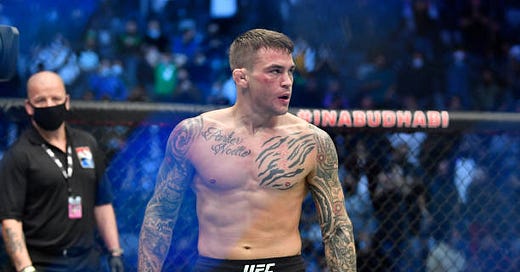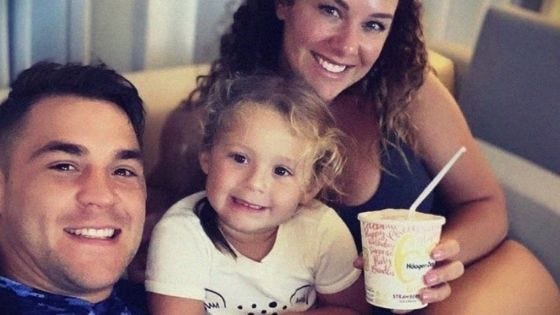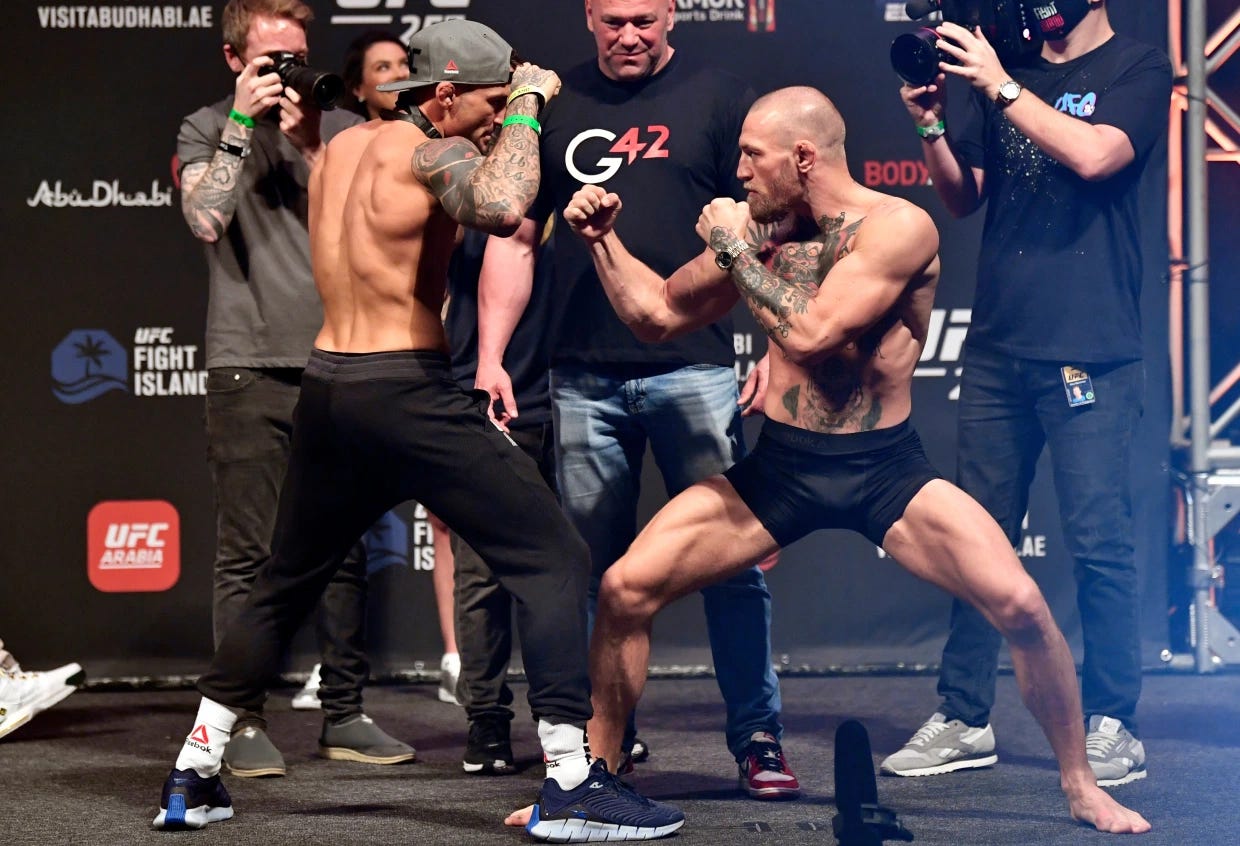When Your Favorite Fighter Beats Conor McGregor
I’ve been in love with Dustin Poirier for five years.
You’ve been in love with a professional athlete, right? It’s more than just their athletic prowess. You get to know them through their interviews; a one-sided bond grows and deepens. I think it’s the strongest emotional attachment I’ve ever felt for an athlete1.
I’ve been along for the last five years of his bumpy career -- a few awe-inspiring victories followed by a heartbreaking setback of a loss -- rinse, repeat. Most recently, the loss stage of that cycle was a submission loss to the lightweight champ, the undefeatable Khabib Nurmagomedov2. I cried along with Dustin that day… and not just because I lost $50 on my first-ever sports bet. My heart broke for the man who thought he was realizing his destiny as champion, but was instead manhandled the same way Khabib manhandles everyone.
But getting to fight Conor McGregor is a big deal, arguably bigger than a title fight. More money and more fame. A bunch of would-be internet pundits suddenly know your name. It opens doors. Plus Conor beat Dustin back in 2014 during his meteoric rise, and the real ones want every loss back.
Why the intense emotional attachment? Dustin “The Diamond” has a simple charm. He’s a Cajun kid from Lafayette, Louisiana. He trains in south Florida at American Top Team, one of the meccas of modern combat sports, but lives in Louisiana when he’s not training for a fight. He told Sean Evans of Hot Ones that he and his wife Jolie moved back to Louisiana when his daughter was born because he refused to deprive her childhood of family crawfish boils. In Fightville, you get a glimpse into his troubled past. Like many other prominent fighters, Dustin was headed down a dark road in his youth, replete with street fights, prison tattoos from a guy named Slim, and correction facilities. He met Jolie as a teenager and, with her help, started channeling his aggression into martial arts. (We sure do love a reformed bad boy, don’t we?) He’s had a chip on his shoulder his whole life; he likes to say that a fight is “25 minutes to make life fair.” Sometimes it takes a visceral reminder to feel the wisdom of a truism. Dustin’s career is that visceral reminder of what you can do with just a big dream and an unstoppable work ethic. Outside of fighting and family time, he’s the president of the Good Fight Foundation, to help underserved communities in Louisiana. How do you not root for this guy?
In the week leading up to the fight, Conor was strikingly different from his typical pre-fight form. No brash shit-talking, no furniture dolly thrown at Dustin’s bus, hardly a raised voice even. He clearly respects Dustin as both a fighter and a man. He did predict securing a knockout in under 60 seconds, but even that he did calmly, almost a little apologetically. Conor’s in his 30s now. He’s traded in the flashy hairstyles of his youth for the bald-and-beard look. Instead of throwing verbal jabs and water bottles at the pre-fight press conference, he’s stepping offstage to kiss his wife and two young children. Conor’s progression from loud-mouthed punk to seasoned vet reminds me of the passage of time. He’s no kid anymore; I guess I’m not either.
All that is not to say that he’s lost his edge. I don’t think the money has changed him. He simply has nothing left to prove. Sure, he’s lost fights here and there, but he’s done things no one else has ever done... or even thought to do. He’s the UFC’s first two-division champ, having simultaneously held the 145- and 155-pound belts. Jose Aldo was the 145-lb champ for six years until Conor KOed him in 13 seconds. Conor pulled Floyd Mayweather, maybe the best defensive boxer of all time, out of retirement and actually landed shots on him. So to me, there was no weakness displayed in Conor’s placidity; it was actually a little eerie. He’s never looked more like a trained killer.
At 12:30 AM on the night of January 23rd, I sat home alone in the dark watching the walk-outs. The arena in Abu Dhabi went black as Sinead O’Connor’s haunting vocals, Conor’s signature walkout music, broke the silence. My heart thumped in time to the beat as a palpable anxiety moved through my midsection. My throat constricted. Is this what a panic attack feels like? Just as the thought wandered between my temples, the play-by-play guy Jon Anik expressed the same: “I don’t know exactly what’s going on in my body right now, but I’m anxious.”
Dustin showed up in his best form to date. Displaying a sound game plan, he chopped away at Conor’s wide karate stance with leg kicks, neutralizing Conor’s lead leg to keep him from stepping into his infamous left-hand cross. But Dustin was outboxed in the first round, losing the round on every judge’s scorecard despite the leg kicks and a solid takedown. Early in round two, though, Dustin visibly settled into the fight and started to find his boxing groove, falling into what I’ve come to think of as a “Dustin flurry.” Six, seven-punch combos pieced together in a zen-like flow state. He did it to Eddie Alvarez, he did it to Justin Gaethje, and now he’s done it to Conor McGregor. In stark contrast to Conor’s one-punch knockout style, Dustin scrambles your brain slowly, caramelizes you with a barrage of knees, elbows, kicks, and punches. High-pitched wails escaped my vocal cords as the ref stepped in to stop the fight. My dog Nyla shook out of her sleep and, unsure how to respond to this new frequency, came and sat in front of me, attempting to pacify me. I hoped it wouldn’t wake my neighbors but I couldn’t find the off switch for the wail. Five years of staying in on Saturday night to watch fights, tuning in to fight breakdown podcasts on Monday, spending way too much money on pay-per-views, witnessing favorite fighters get knocked unconscious, culminated in that moment when Dustin stopped the biggest superstar MMA’s ever seen. Plus I won $250 on my second-ever sports bet.
I woke up smiling on Sunday morning. I lay in bed, lazily scrolling my social media feeds. For once, they were all Dustin. Finally. The rest of the world was in love with him, too.
My childhood obsession with Mia Hamm is a close second.
Fun fact: he grew up wrestling bears in Dagestan.




